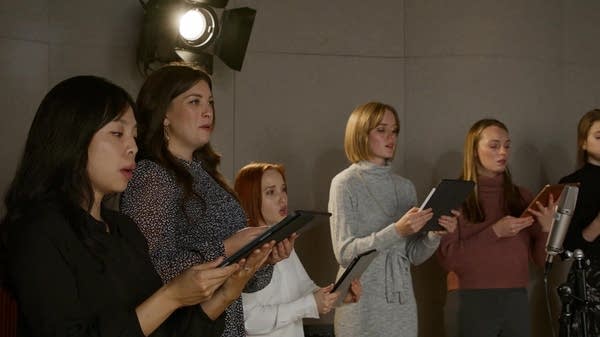For nearly half of his 82 years on this earth, Robert Shaw was arguably the most significant figure in American choral music. Shaw was born 100 years ago, on April 30, 1916, in Red Bluff, Calif. A minister's son, Shaw found his spiritual calling in music, establishing New York's Collegiate Chorale and the famed Robert Shaw Chorale in the 1940s, preparing choruses for renowned conductors Arturo Toscanini and George Szell from the late '40s into the 1950s, and bringing prominence to the Atlanta Symphony Orchestra and Chorus as music director from 1967 to 1988.
"He changed choral music in the United States of America," says Ann Howard Jones, director emerita of choral activities at Boston University. For many years, Jones sang for Shaw and worked as his assistant with the Atlanta Symphony Chorus. Participating earlier this month in a Shaw centennial symposium co-sponsored by Chorus America and the Atlanta Symphony, Jones argued that prior to Shaw, American choral music was "too much about the conductor — the 'Westminster sound,' the 'St. Olaf sound.' Shaw changed all that."

When you listen to a recording of a Shaw chorus, what will stand out immediately is the beauty and clarity of the sound, Jones says, and the recipe for that is simple: "Everybody's doing the same thing at the same time. Shaw would always say, 'The right note at the wrong time is the wrong note.'"
Of course, getting dozens of singers to do the same thing at the same time is far from simple. Shaw made it happen through techniques he honed over the decades, instilled in his choruses. He rehearsed each piece painstakingly, one facet at a time: rhythm, dynamics, pitch, balance, text. "His rehearsals were more about the ear and the mind than they were about the voice," Jones says.
Working with ensembles consisting mostly of volunteers, choral conductors cannot assume their singers have extensive musical training. But Shaw set a professional standard, and he was proud of it. "I asked [Cleveland Orchestra Music Director] George Szell why he hired me," Shaw once told an interviewer. "He said, 'Because you treat the chorus the same way I treat the orchestra." Working with his singers, Shaw employed disciplines of a kind that others would apply only to skilled instrumentalists.
"He had very high expectations," recalls symposium and University of Alberta faculty member Leonard Ratzlaff. "It could be the smallest intricacy, but when someone screwed up, he stopped immediately. The singers learned to respect the perspicacity of his ears. He could pick up anything."
Systematic building of discipline is far less common these days, says Jones, as is the "sometimes irascible, cantankerous" treatment he gave his musicians. But, she says, "we would put up with all of that because we knew that there was a more profound exposure to the music and exposure to him that was possible."

"Mr. Shaw was a towering intellect, the likes of which I had never encountered," says Craig Jessop, former music director of the Mormon Tabernacle Choir and another Shaw acolyte who spoke at the symposium. "He was a huge presence, physically and spiritually as well." When he led a performance of A German Requiem, "Brahms would come into the room because Mr. Shaw was channeling that energy. He never would insert himself into music; he honored what was embedded in the score. Mr. Shaw dedicated his life to doing that."
Along with the music, Shaw loved the power of words. His singers treasured moments when he would share that love in rehearsals or in the occasional letters he wrote to them. Often, despite the fact that he was not a religious man, his words revealed deep scriptural understanding, as well as profound belief in the redemptive value of the arts. One of his letters, addressed to the Atlanta Symphony Chorus on the eve of a 1972 Brahms Requiem performance, ended with this invocation: "…when one lovingly and earnestly obeys the laws of great music, there is always the chance that the flesh will be made word and dwell among us."
Don Lee is a media producer, editor, writer, and amateur choral singer who lives in St. Paul, Minn. Previously, at NPR in Washington, D.C., he was executive producer of Performance Today.
Love the music?
Show your support by making a gift to YourClassical.
Each day, we’re here for you with thoughtful streams that set the tone for your day – not to mention the stories and programs that inspire you to new discovery and help you explore the music you love.
YourClassical is available for free, because we are listener-supported public media. Take a moment to make your gift today.












